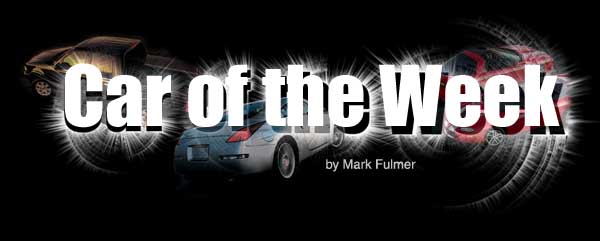
2004 Toyota PriusBehold Intelligent Transportation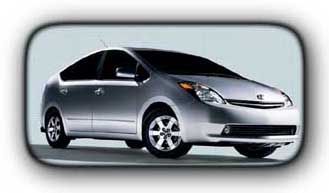
I emerged from my home contemplating a grocery list. The car sensors
detected when I walked up and unlocked itself. Pushing the POWER button
, the car silently started. A touch of throttle and the 6 block trip beg
an. 15 minutes later I was back home. I had not used a drop of gasoline
- and each time I coasted or used the brakes, I was refueling. 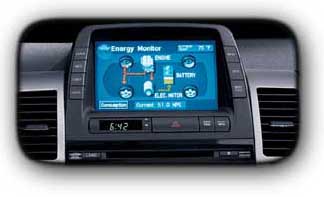
It would be incomplete to say that the Prius is powered by a
76-horsepower, 1.5-liter, four-cylinder engine along with an
electric motor that puts out 50 kilowatts for another 67 horsepower.
When it comes to torque and acceleration the engines can work
together to produce a turbo-charged-like effect that is quite
satisfying. Merging onto a freeway or passing slower traffic
is no problem. Frequent stops at a gas station are no longer
needed as the Prius is at the head of the class with 60 mpg in
town and 51 on the highway. The transition between electric and
combustive power cannot be felt and can barely be heard during
all normal driving. And let us not forget that if you are living
in a metropolitan area, the "exhaust" from the Prius is cleaner than
the air going in.
So why, you may wonder, is the electric system so improved? I wondered too until legendary PR guy Michael Dobrin (who handles the Toyota press fleet for the west coast) replied: "The first edition Prius vehicles were equipped with a pack of round D-cell type batteries. Internally and technically these batteries with their individual round plates were only as good as the surface area of the smallest plates. Individual batteries in the new Prius battery pack are square and have greatly improved wiring and current distribution than the older round batteries. They are smaller and save weight. The new Prius is also equipped with a sophisticated inverter that doubles current output." So how, I also wondered, do these rechargable batteries avoid bad "memory" (like cell phone & laptop batteries)?
"Prius batteries are nickel metal hydride and are not susceptible
to memory issues found on older NICAD batteries. In fact, the Prius
nickel metal hydride batteries operate with a full range of charges
without memory issues: they’re never fully charged nor fully discharged."
- Mark Fulmer, Editor |
 Wow! The Web's Biggest and Best New Vehicle Guide! |
|
|
CAR OF THE WEEK |



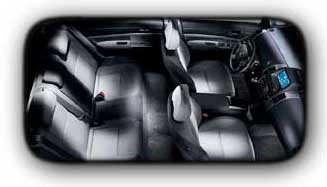 The interior has grown from last year, expanding the Prius
into the 4-door mid-sized sedan. Cool new items included
LCD instrument display tucked deep into nifty little cave
way, way up in the front of the dash. Finally, a mid-day
sun proof LCD.
The interior has grown from last year, expanding the Prius
into the 4-door mid-sized sedan. Cool new items included
LCD instrument display tucked deep into nifty little cave
way, way up in the front of the dash. Finally, a mid-day
sun proof LCD.
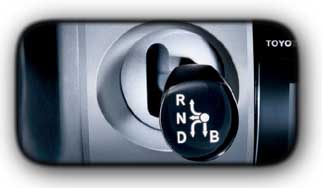 The second is the shifter which is really a
"selector", a nifty little L-shaped lever that you use to
choose a gear - including the "B" gear for downhill compression.
The second is the shifter which is really a
"selector", a nifty little L-shaped lever that you use to
choose a gear - including the "B" gear for downhill compression.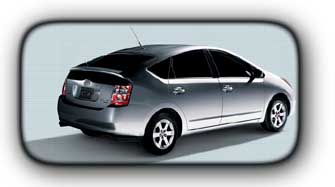 I thought that perhaps last years test was a fluke - so many
people from so many walks of life were so eager to try the
Prius and knew so much about it. No fluke, it seems. This
year the response was equally diverse and intense. So for
all the flash and dash about "performance" in new cars, and
all the posh and plush in the luxury and SUVs, there is
growning interest and enthusiasm in intelligent transportation
- and the leader of that pack is the 2004 Toyota Prius.
I thought that perhaps last years test was a fluke - so many
people from so many walks of life were so eager to try the
Prius and knew so much about it. No fluke, it seems. This
year the response was equally diverse and intense. So for
all the flash and dash about "performance" in new cars, and
all the posh and plush in the luxury and SUVs, there is
growning interest and enthusiasm in intelligent transportation
- and the leader of that pack is the 2004 Toyota Prius.
